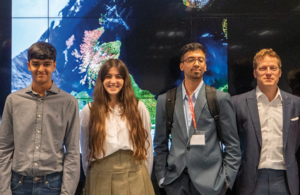
A team of ten students from the University of Glasgow has wonthe Nanosat Design Competition,a government-run competition to develop a climate change satellite for launch from the UK.
The students designed a satellite to analyse shorelines and coastal vegetation to help scientists and policymakers understand the impact of climate change on coastal regions. Dubbed OirthirSAT, the team beat more than 40 teams from across the UK, made up of students aged between 16 and 37. The judges praised the team’s entry for identifying a clear way to tackle climate change and test new technologies.
‘With satellite launches due to start from home soil this year, there is no better time to support the next generation of space experts in developing satellites to support our mission against climate change,’ said transport secretary Grant Shapps. ‘My congratulations go to OirthirSAT and everyone shortlisted for their hard work throughout this competition, and I applaud the innovation all the teams have shown throughout.’
‘Satellite technology plays a crucial role in monitoring our climate and it is fantastic to see so many innovative ideas to help tackle the most pressing issue facing our planet. My congratulations go to the winners from the University of Glasgow for their excellent design,’ said Paul Bate, chief executive of the UK Space Agency, which ran the competition together with the Department for Transport. ‘The countdown to the first satellite launch from UK soil is on and this will be a historic year for our space sector. Being the first country in Europe to offer launch will boost our satellite industry further, creating hundreds of new jobs across the UK.’
Five teams were shortlisted to go through to the final stage, which included a four-month mentoring programme with space sector experts. The four other finalists came from Reliance Precision Engineering in Huddersfield, Sir William Borlase’s Grammar School in Marlow, Buckinghamshire, the University of Kent and the University of Southampton.
‘We’re so proud to have won the competition and have all our hard work recognised by the sector. It’s not just a win for us and the university, but for coastal stakeholders and decision-makers who will get valuable use from our data,’ said Freya Muir, a PhD student at the University of Glasgow. ‘This is an incredible opportunity and it’s hugely exciting to be able to develop our winning design to help protect our coastal communities against climate change.’
Glasgow’s OirthirSAT team will use the £600,000 prize money to build their satellite with ongoing support from the competition’s mentors, to help develop their proposal from design to build, with a view to launching from the UK in the coming years.
Meanwhile, a teenager from Derby has won the UK Space Agency’s SatelLife Competition, which called for innovative ideas on how satellites can improve life on Earth. Awais Ali, 16, a pupil at Derby Grammar School, will receive £3,000 and expert advice on how to develop his idea for an app for cyclists that would help them choose routes and send an automatic alert if they had an accident.
Now in its fifth year, the SatelLife Competition awards young people a share of £50,000 for the best ideas for how to use data collected from space to benefit daily life. Among this year’s ideas were apps to help energy consumers, protect plans vital for carbon absorption and improve the prediction of earthquakes.
‘When I heard I had won, I was ecstatic. My idea started when I read up about the eCall technology in cars, which automatically calls emergency services with your location in the event of an accident, but I couldn’t find any similar products made especially for cyclists, like myself. Cyclists regularly ride in rural areas and often in isolation, so a design feature to ensure their safety is paramount,’ Ali said. ‘I would be thrilled to have my idea taken into production as it would be so rewarding to be part of a product that could save a life.’


